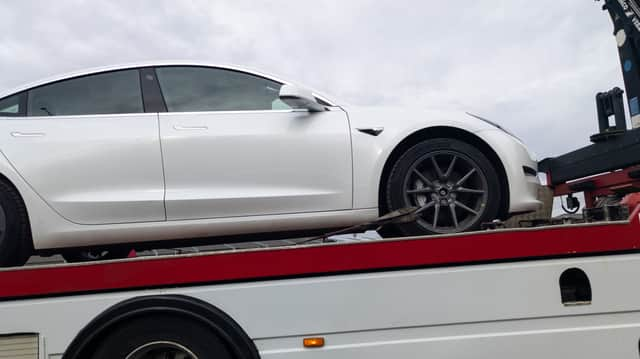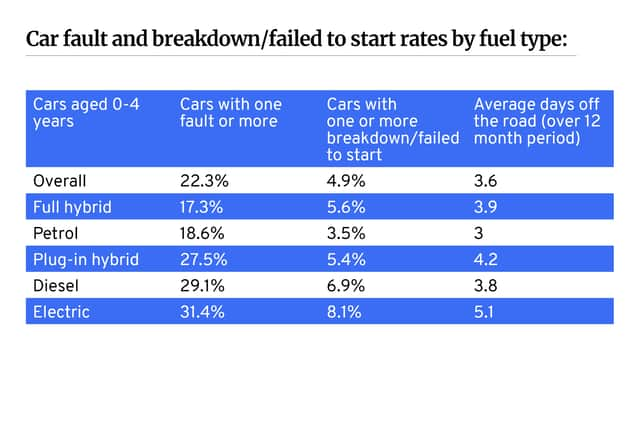EVs ‘less reliable than petrol’ and Tesla is the worst of all, claims study


A new study claims that new electric cars are less reliable than their petrol or diesel equivalent.
Research by consumer group Which? suggests EVs aged up to four years experience more faults than petrol diesel or hybrid vehicles, but motoring groups have cautioned drivers to take the findings “with a pinch of salt”.
Advertisement
Hide AdAdvertisement
Hide AdThe Which? survey of nearly 50,000 drivers found that 31% of EV owners had experienced a fault with their car in the past 12 months, compared to 19% of petrol drivers. It also found that EVs spent longer off the road than internal combustion engined (ICE) cars - an average of five days compared with three.
However, the study showed that the majority of problems with EVs were software related rather than mechanical. The RAC’s head of technical said such problems - which could cover everything from the car’s radio to starting problems - could generally be fixed more easily and often without having to visit a dealer.
Which? has called for car makers to improve the reliability of their EVs, saying that the fact they have fewer moving parts should make them less vulnerable to problems.
Lisa Barber, home products and services editor for Which?, said: “We know that drivers are keen to make the move to more environmentally-friendly cars but it is vital that they are getting a quality product. Whilst it’s disappointing to see that EVs as a group are the least reliable, Kia’s e-Niro shows there is a significant opportunity for manufacturers to up their game.”
Advertisement
Hide AdAdvertisement
Hide AdThe battery-powered Kia e-Niro was not only the most reliable EV overall but also the most reliable car in its class, regardless of fuel type, with just 6% of drivers refporting any kind of fault.
Conversely, America’s Tesla came in for particular criticism, with 39% of owners reporting problems with their cars, making it the least reliable EV brand. Which? has previously called for the firm’s £80,000 Model S to be recalled over repeated and well-documented problems with its door handles and locks.


The RAC’s head of technical James Gibson commented: “These findings should be taken with a pinch of salt.
“There is no question there are fewer moving parts with electric cars which makes them more reliable than a petrol or diesel car in the long run, but it’s also the case that the software running them is more complex, which has the potential to cause some issues.
Advertisement
Hide AdAdvertisement
Hide Ad“But it’s very important to realise that most software problems can be solved easily, either by wireless updates or ‘restarts’ in the same way as a desktop computer simply by disconnecting the 12v auxiliary battery and ‘rebooting’ the system, something our expert patrols routinely do for our members in these situations. Many manufacturers are also able to help drivers sort issues out over the phone by getting them to carry out certain functions to reboot systems.
“While taking a new electric car back to the dealership is clearly frustrating, it can be the case with any new car, regardless of how it’s powered.”
The survey found that full hybrid cars were the least likely to develop a fault (17%), just ahead of petrol (19%). Plug-in hybrids and diesel suffered noticeably more faults, at 27% and 29% respectively.
New EV sales soared by 76% in 2021 but represented only around 12% of all new cars sold in the UK.
Comment Guidelines
National World encourages reader discussion on our stories. User feedback, insights and back-and-forth exchanges add a rich layer of context to reporting. Please review our Community Guidelines before commenting.
